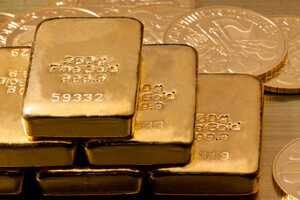A new package of sanctions against Russia may be approved as early as next week.

The European Commission announced plans to ban the import of Russian gold within the new package of sanctions against the Russian Federation, but for now it leaves Russian jewelry off the list of sanctioned goods, according to a draft of the new restrictions seen by Politico.
The EU began developing plans to ban gold imports from Russia after the G7 countries announced an embargo on Russian gold last month in an attempt to stifle revenues for the Kremlin's war machine.
“Russia's brutal war against Ukraine has not stopped. Moscow must continue to pay a high price for its aggression,” said European Commission President Ursula von der Leyen.
The draft of the new package of sanctions, which still has to be approved by the EU countries, states that “it is prohibited to buy, import or transfer, directly or indirectly, gold, if it originates from Russia or was exported from the Russian Federation to the EU countries or to any third country.”
But a draft annex to the document obtained by Politico shows that the bloc would ban only gold in powder, unprocessed or semi-manufactured form, as well as gold coins and gold waste or scrap. The draft does not mention gold in the form of jewelery such as gold chains or rings. This may leave loopholes through which money can flow into the Kremlin's “treasury”.
Russia exports billions of euros worth of gold every year. In 2019, about 90 percent of Russian gold exports went to Great Britain.
The European Commission's plans go beyond a simple ban on the import of Russian gold. The proposal is part of a new sanctions package that also includes stricter reporting requirements to freeze the assets of sanctioned individuals and strengthen controls on advanced technology exports. For example, the European Commission plans to ban the export to Russia of tear gas, fingerprint ink, police helmets and shields, as well as water cannons that can be used against people, according to the draft of the new sanctions package.
In an apparent attempt to counter the Russian narrative that EU sanctions are fueling world hunger by blocking grain and food exports, the draft of the new package of restrictions includes certain exemptions for asset freezes. Countries can allow the use of frozen assets if they are intended to prevent events that will have “serious and significant effects on human health and safety or the environment.” A similar exception applies to the import and transport of agricultural and food products such as wheat and fertilizers.
When asked if this was an acknowledgment that the EU had previously blocked the flow of fertilizers or grain, an EU diplomat said it had rather a “cosmetic” step.
“The European Commission does not say that we have done something that prevents the export of grain, but on the contrary, it ensures that there are no secondary consequences of other sanctions that could in some way create even a hint of an administrative burden on the export of grain,” said the EU diplomat.
EU foreign ministers will discuss the plans on Monday, July 18, according to several diplomats. The EU ambassadors can then accept the project during the meeting.
After the European Commission took weeks to get all countries on board with the previous sanctions package — largely because Hungary blocked a ban on Russian oil, EU diplomats told Politico that the new round of restrictions is likely to pass without major problems.< /p>
Read also: The European Commission proposes a new package of sanctions against the Russian Federation: what will it include
Earlier it was reported that in the new package of sanctions the European Commission may change some of the introduced restrictions against Russia, so as not to hinder food exports.
Also, the EU is discussing the possibility of lifting sanctions against some Russiansafter the bloc's lawyers discovered that the restrictions could have been introduced “on flimsy grounds”.
See special topic: Markarova responded to allegations of non-transparency in the use of US funds to arms There has never been such a level of mutual transparency with the USA as it is now. The ambassador informed when Ukraine will use lend-lease from the USA Currently, Ukraine receives military aid on a free basis. Reconnaissance officers managed to evacuate a group of civilians from Sviatohirskaya Lavra The family hid within the walls of the Lavra from constant shelling by the occupiers The occupiers terrorize the educators of the Kherson region – Butrii What difficulties are befalling the people of Kherson because of the occupiers. The Ukrainian Armed Forces are still defending two settlements of the Luhansk region – Gaidai But Russian troops are constantly storming this territory of the Luhansk region.




